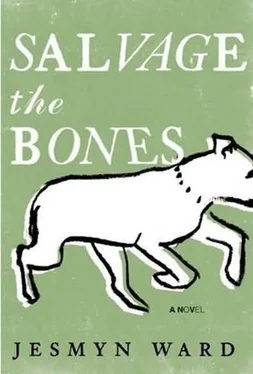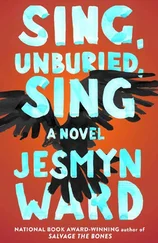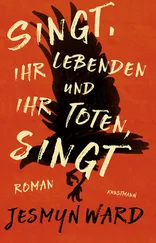Last night, we laid sleeping pallets in the living room, whose windows we’d lined with mismatched wood. Randall and I, side by side, on the floor, and Junior on the couch. We brought our own limp pillows, our flat and fitted sheets, and our old electric blankets short-circuited cold long ago. We piled them to create mattresses so flimsy we could feel the nubby carpet on the floor underneath us when we sat. We washed all the dishes. We filled the bathtub, the kitchen and the bathroom sinks to the brims with water that we could use for washing and flushing the toilet. We ate a few of the boiled eggs, and Randall cooked noodles for all of us. We balanced the hot bowls in our laps and watched TV. We took turns picking shows. Randall watched a home improvement show where a newlywed couple converted a room in their house from an office into a mint-green nursery. I chose a documentary on cheetahs. Junior picked last, and once there were cartoons on the screen, even after Junior fell asleep, we let them turn us bright colors in the dark. Daddy stayed in his room, but he left the door open. Skeetah stayed in his room with China and the puppies, but that door was closed.
Before I fell asleep, in the flickering light from the television and one dusty lamp, I read. In ancient Greece, for all her heroes, for Medea and her mutilated brother and her devastated father, water meant death. In the bathroom on the toilet, I heard the clanking of metal against metal outside, some broken machine tilting like a sinking headstone against another, and I knew it was the wind pushing a heavy rain.
On the day before a hurricane hits, the phone rings. When Mama was living, she picked it up; it is a phone call from the state government that goes out to everyone in the area who will be hit by a storm. Randall has answered it since we lost Mama; he lets it play at least once each summer. Skeetah answered once and hung up before the recording could get beyond the hello . Junior never has picked it up, and neither has Daddy. I picked it up for the first time yesterday. A man’s voice speaks; he sounds like a computer, like he has an iron throat. I cannot remember exactly what he says, but I remember it in general. Mandatory evacuation . Hurricane making landfall tomorrow. If you choose to stay in your home and have not evacuated by this time, we are not responsible. You have been warned. And these could be the consequences of your actions. There is a list. And I do not know if he says this, but this is what it feels like: You can die .
This is when the hurricane becomes real.
The first hurricane that I remember happened when I was nine, and of the two or three we get every year, it was the worst I’ve ever been in. Mama let me kneel next to the chair she’d dragged next to the window. Even then, our boards were mismatched, and there were gaps we could peer out of, track the progress of the storm in the dark. The battery-operated radio told us nothing practical, but the yard did: the trees bending until almost breaking, arcing like fishing line, empty oil drums rattling across the yard, the water running in clear streams, carving canyons. Her stomach was big with Junior, and I laid a hand on it and watched. Junior was a surprise, a happy accident; she’d had me and Skeetah and Randall a year apart each, and then nothing else for nine years. I kneeled next to her and put my ear to her stomach and heard the watery swish of Junior inside her, as outside the wind pulled, branch by root, until it uprooted a tree ten feet from the house. Mama watched with her eye to the slit formed by the board over the window. She rocked from side to side like the baby in her would not let her sit still. She stroked my hair.
That storm, Elaine, had been a category 3. Katrina, as the newscaster said late last night after we settled in the living room, echoing Daddy, has reached a category 5.
During Elaine, Randall and Daddy had slept. Skeetah had sat on the other side of Mama, opposite me, and she’d told us about the big storm when she was little, the legend: Camille. She said Mother Lizbeth and Papa Joseph’s roof was ripped off the house. She said the smell afterward was what she remembered most clearly, a smell like garbage set to rot, seething with maggots in the hot sun. She said the newly dead and the old dead littered the beaches, the streets, the woods. She said Papa Joseph found a skeleton in the yard, gleaming, washed clean of flesh and clothing, but she said it still stank like a bad tooth in the mouth. She said that Papa Joseph never took the remains down to the church, but carried it in an oyster sack out into the woods; she thought he buried the bones there. She said she and Mother Lizbeth walked miles for water from an artesian well. She said she got sick, and most everybody did, because even then the water wasn’t clean, and she had dreamed that she could never get away from water because she couldn’t stop shitting it or pissing it or throwing it up. She said there would never be another like Camille, and if there was, she didn’t want to see it.
I fell asleep after everyone else did last night, and now I wake before everyone. Daddy snores so loudly I can hear him from his room. Randall sleeps with his face turned to the sofa Junior is asleep on, his back to me, curved like he hides something. Junior has one arm off the sofa, one leg, and his cover hangs from him. The TV is dead. The house is quiet in a way it never is, its electric hum silent; in our sleep, the arriving storm has put a strangling hand over the house. We’ve lost power. Through the crack in the living room window, the morning is dark gray and opaque as dirty dishwater. The rain clatters on the rusted tin roof. And the wind, which yesterday only made itself known by sight, sighs and says, Hello . I lay here in the dark, pull my thin sheet up to my neck, stare at the ceiling, and do not answer.
Mama had talked back to Elaine. Talked over the storm. Pulled us in in the midst of it, kept us safe. This secret that is no longer a secret in my body: Will I keep it safe? If I could speak to this storm, spell it harmless like Medea, would this baby, the size of my fingernail, my pinkie fingernail, maybe, hear? Would speaking make it remember me once it is born, make it know me? Would it look at me with Manny’s face, with his golden skin, with my hair? Would it reach out with its fingers, pink, and grasp?
The sun will not show. It must be out there, over the furious hurricane beating itself against the coastline like China at the tin door of the shed when she wants to get out and Skeet will not let her. But here on the Pit, we are caught in the hour where the sun is hidden beyond the trees but hasn’t escaped over the horizon, when it is coming and going, when light comes from everywhere and nowhere, when everything is gray.
I lie awake and cannot see anything but that baby, the baby I have formed whole in my head, a black Athena, who reaches for me. Who gives me that name as if it is mine: Mama . I swallow salt. That voice, ringing in my head, is drowned out by a train letting out one long, high blast. And then it disappears, and there is only the sound of the wind like a snake big enough to swallow the world sliding against mountains. And then the wind like a train, again, and the house creaks. I curl into a ball.
“Did you hear that?”
It is Skeetah; I can barely see him. He is only a wash of greater darkness that moves in the dark opening of the hallway.
“Yeah,” I say. My voice sounds like I have a cold, all the mucus from my crying lodged in my nose. A train , Mama said. Camille came, and the wind sounded like trains . When Mama told me this, I put my nose in her knee. I’d heard trains before when we went swimming on the oyster shell beach, and the train that ran through the middle of St. Catherine would sound loudly in the distance. I could not imagine wind sounding like that. But now I hear, and I can.
Читать дальше












